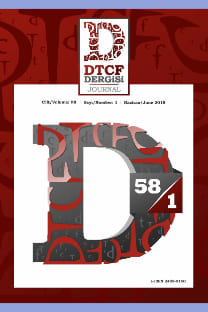SPEKÜLATİF KURGUDA SALGIN TEMASI
PANDEMICS AND EPIDEMICS IN SPECULATIVE FICTION
___
- Alperen, Altan. “Bilimkurgu romanlarındaki zamanötesi dünya.” Bilig 2 (1996): 261- 265. Web. 12 Temmuz 2020.
- Andrews, Travis M. “Sure, binge ‘Contagion’ and other pandemic movies right now. But their creators urge you to watch with caution.” Washington Post 19 Mach 2020. Web. 22 Nisan 2020.
- Atwood, Margaret. Antilop ve Flurya. İstanbul: Oğlak Yayınları, 2005.
- Boz, Mikail ve Dilek Takımcı. “Amerikan post-apokaliptik bilimkurgu sinemasında kıyamet ideolojisi (1924-2000).” Akdeniz Üniversitesi İletişim Fakültesi Dergisi 31 (2019): 377-403. Web. 18 Temmuz 2020.
- Camcıoğlu, Yıldız. “İmmün sistemin doğuştan kusurları ve korona virüs pandemisi”. Turkish Journal of Immunology 8. 1 (2020): 13-20. Web. 21 Temmuz 2020.
- Ciabattari, Jane. “The plague writers who predicted today.” BBC 14 April 2020. Web. 28 Nisan 2020.
- Clay, Lauren. “Generation COVID: Exploring the pandemic’s long-term impact on generation z.” Danacommunications 6 August 2020. Web. 7 Ağustos 2020.
- Davich, Jerry. “COVID-19 makes us feel as if we are living in a science-fiction movie --- and none of us know the ending.” Chicago Tribune 13 April 2020. Web. 2 Ağustos 2020.
- uchs, Christian. “Everyday life and everyday communication in coronavirus capitalism.” Triple 18. 1 (2020): 375-399. Web. 19 Haziran 2020.
- Guba, Egon G. ve Yvonna S. Lincoln. “Competing paradigms in qualitative research.” Handbook of Qualitative Research. Ed. Norman K. Denzin ve Yvonna S. Lincoln, Thousand Oaks, Ca: Sage, 1994. 105-117. Web. 19 Temmuz 2020.
- Gürlevik, Sibel Laçinel. “Koronavirüsler ve Yeni Koronavirüs Sars-CoV-2.” Journal of Pediatric Infection 14. 1 (2020): 46-48.
- Heinlein, Robert A. “On the writing of speculative fiction.” Of Worlds Beyond: The Science of Science Fiction Writing. Ed. Lloyd Arthur Eshbach. Reading, PA: Fantasy, 1947. 13-19.
- İmamoğlu, Abdulfettah. “Apokaliptik modernizm, bilim-kurgu ve mekânın sonu.” MOLESTO: Edebiyat Araştırmaları Dergisi 2. 1 (2019): 12-34. Web. 27 Haziran 2020.
- Jones, Lora, Daniele Palumbo ve David Brown. “Coronavirus: A visual guide to the economic impact.” BBC 30 June 2020. Web. 5 Temmuz 2020.
- Khatib, Joumana ve diğerleri. “Your quarantine reader.” New York Times 12 March 2020. Web. 20 Mayıs 2020.
- Ma, Ling. Severance: A Novel. New York: Farrar, Straus and Giroux, 2018. Outka, Elizabeth. Viral Modernism: The Influenza Pandemic and Interwar Literature. New York: Columbia University Press, 2020.
- Passell, Aaron. “SF novels and sociological experimentation: examining real world dynamics through imaginative displacement.” Science Fiction and Speculative Fiction: Challenging Genres. Ed. P. L. Thomas. Rotterdam: Sense Publishers, 2013. 59-72.
- Saramago, José. Körlük. 23. Basım. İstanbul: Kırmızı Kedi Yayınevi, 2020. Sargent, Lyman Tower. “The three faces of utopianism revisited.” Utopian Studies 5. 1 (1994): 1-37. Web. 29 Haziran 2020.
- Self, John. “Why people are returning to pandemic fiction to help process the Covid-19 crisis.” Web. 19 Nisan 2020.
- Streeby, Shelley. Imagining the Future of Climate Change: World-Making Through Science Fiction and Activism. Berkeley, California: California UP, 2018.
- Witte, William. “The sociological approach to literature.” The Modern Language Review 36. 1 (1941): 86-94. Web. 1 Ağustos 2020.
- Wood, Heloise. “The books that could flourish in this pandemic era.” BBC 7 Mayıs 2020. Web. 19 Mayıs 2020.
- ISSN: 0378-2905
- Yayın Aralığı: 2
- Başlangıç: 1942
- Yayıncı: Ankara Üniversitesi Dil ve Tarih-Coğrafya Fakültesi
JAVIER MARÍAS'IN “TÜM RUHLAR” VE “ZAMANIN KARANLIK YÜZÜ” ADLI ROMANLARINDA ÜSTKURGUSAL UNSURLAR
Selda EKİCİ, Bülent Nazım YILMAZ
BİR POSTMODERN BİYO-KURGU ANLATISI: PASCAL QUIGNARD’IN ROMA’DAKİ TERAS’I
İLKOKUL VE ORTAOKUL ÖĞRENCİLERİNDE GÖRSEL ALGI TEMELLİ ULAMLAŞTIRMA
A.S. BYATT'IN ÇEŞM-İ BÜLBÜLÜN İÇİNDEKİ CİN HİKÂYESİNDE TÜRK KÜLTÜRÜ VE ORYANTALİST SÖYLEMİN ÇÖKÜŞÜ
DIDIER DAENINCKX'İN “LA MORT N'OUBLIE PERSONNE” 1 BAŞLIKLI ROMANINDA İŞGAL, DİRENİŞ VE ADALET
TÜRKÇE ÖĞRENEN YABANCILARIN KULLANDIKLARI DİL ÖĞRENME STRATEJİLERİ
Sebahat ALAN, M. Ertan GÖKMEN, Dilek PEÇENEK, Hasan Fehmi ÖZDEMİR
BAŞINI EĞMEYEN CELİLELER, CAVİDELER, CEVRİYELER: SUAT DERVİŞ'İN ROMANLARINDA AHLÂK MESELESİ
BOMBAY ŞEHBENDERİ ALİ GALİP BEY'İN HİND ADALARI İLE İLGİLİ İZLENİMLERİ
